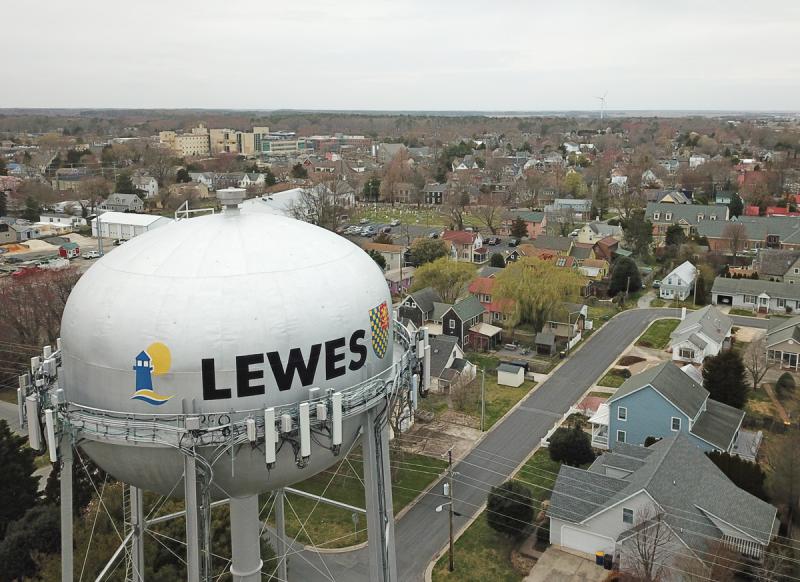A squabble between the Lewes Board of Public Works and the City of Lewes is headed to court Monday, Sept. 9.
That’s when a motion to dismiss filed by the city will be heard by Judge E. Scott Bradley in Superior Court.
On Aug. 29, 11 days before the hearing, the BPW amended its complaint, seeking to reinforce its case that it is independent of the city.
The issue is whether the BPW must force a landowner seeking BPW services to sign an agreement giving the city the right to annex the property at any time, whether the property owner wants annexation or not.
The BPW claims it has the authority to waive the requirement or remove the requirement entirely. The city argues the BPW cannot take those actions without city approval, claiming it has the ultimate authority over BPW decisions and policies.
Although eliminating the pre-annexation agreement has previously been discussed by the BPW, the most recent power struggle stems from an application currently before the board. J.F. Peter, owner of a property near New Road and Captains Circle, is seeking a waiver from the pre-annexation agreement and the requirement to purchase all utilities from the BPW. Peter plans to tap into the BPW’s electric system, but he wants to use an on-site well and septic system. His matter has been tabled until the authority issue is resolved.
Recently, the BPW has signaled its intention to completely abandon the pre-annexation agreement policy, which it considers unenforceable and unlawful, court documents show. However, in response to the city’s objections, the BPW has instead considered issuing waivers from the agreement, granting a waiver for 3.2 acres of the Mitchell farm on Kings Highway in June 2018. As a result, services will be provided to the lot at the corner of Kings Highway and Gills Neck Road with no annexation agreement in place. The lawsuit notes the city did not object to the waiver.
To support its case, the BPW is using a 2016 memorandum written by City Solicitor Glenn Mandalas, when he served as legal counsel for the BPW. The memorandum says he’s unsure whether a pre-annexation agreement would hold up in Delaware courts. He says the BPW has an exclusive franchise and duty to provide service outside the city limits. The only circumstance when it could refuse service is a valid utility-related reason.
“Whether annexation is a valid-utility related reason will largely depend on the court’s interpretation of the relevant facts,” he wrote.
In the 2016 memorandum, Mandalas advises that granting a single waiver could jeopardize the BPW’s ability to impose a pre-annexation requirement entirely.
“Unfortunately, a decision by the BPW to waive an annexation requirement for one property would likely undermine future application of the annexation requirement,” he wrote. “If a waiver were granted such that the requirement would no longer be uniformly applied, future property owners may argue that the BPW is discriminating against customers.”
He added that a waiver would further undermine the legitimate policy basis supporting the requirement.
Mandalas will not be working on the case, as his previous role as the BPW’s attorney creates a conflict.
The BPW also submitted a copy of the 2015 Lewes Comprehensive Plan, where the BPW is described as “in addition and separate” from the city and that it is authorized by the General Assembly under a separate charter to establish, control and regulate an electric light plan, water works and sewer system. It also states only the BPW can implement recommendations related to electricity, stormwater management, drinking water and wastewater in Lewes.
The BPW has been authorized to provide water and sewer service outside the city limits since at least 1963. Municipal utilities are not regulated by the Public Service Commission like other public utilities, including Tidewater or Artesian, but they are still required to obtain a Certificate of Public Convenience and Necessity. A certificate gives the BPW exclusive franchise rights to an area. The BPW’s service area is defined as all of the city and lands within two miles of the corporate limits. On June 24, mayor and city council adopted a resolution directing the BPW to require annexation or a signed pre-annexation agreement prior to agreeing to provide services.
The BPW board met two days later and unanimously voted to reject the city’s authority to adopt the resolution and a related ordinance.
In the revised lawsuit, it says attorneys for the city and BPW agreed by email to jointly submit the dispute to the courts for resolution, and that counsel for the city said that authority was given to him to draft the lawsuit the BPW eventually submitted in July.
Mayor Ted Becker said that’s not accurate.
“While the city had hoped to work cooperatively with BPW to resolve these legal issues, the city’s legal counsel was not involved in drafting the complaint and was only made aware of it when it was filed,” he said.
It has long been the practice of the BPW to require property owners sign an annexation agreement prior to receiving its utilities. Although not put onto paper until a 2007 resolution, the annexation agreement history can be traced back to Mayor Otis Smith’s administration in the 1960s. During a 1966 discussion about extending wastewater down Hornkill Avenue - part of which was and still is outside city limits - BPW decided to only add sewer service to the homes within the city instead of extending the lines an additional 1,000 feet for homes sitting outside city limits.






















































